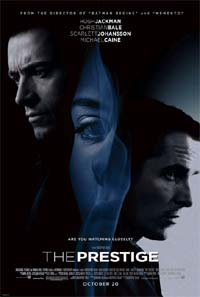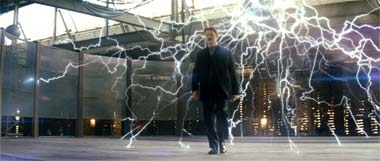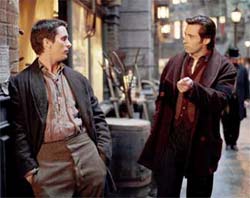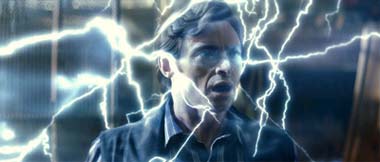"Slight" of Hand: "The Prestige"
 |
The Prestige (2006, Dir. Christopher Nolan)
Are you watching closely?
So intones the redoubtable Michael Caine as the first shot of Christopher Nolan's The Prestige is unveiled: a collection of magician hats piled high in a woodsy setting that wouldn't be out of place in a fairy tale. We know this film has something to do with magic, and Caine's opening question is a challenge, the initial gambit of a game. But if you're expecting magic that is equivalent to a fairy tale, something light-spirited, breathtaking and fun, know this: it ain't this movie.
Even as he's indulged himself with remakes (Insomnia) and reboots (Batman Begins), Nolan's focus has never wavered: he is endlessly fascinated with narratives that twist and turn upon themselves, and protagonists swamped by the chill of their own obsessions. Whether you find this kind of puzzle-film intriguing or simply cold and mechanical might be a matter of taste, but it's certainly a welcome intellectual break from the hamfisted blockbuster.
The Prestige, adapted from Christopher Priest's novel by Nolan and his brother Jonathan (who also came up with the story for Memento), doubles the fun (or perhaps more accurately, doubles the frost) by supplying not one but two obsessive, steel-hearted protagonists (and possibly more -- but that would be giving away the trick). The film's first ten minutes speed by in bewilderment; like Nolan's classic Memento, much of what happens makes sense in retrospect. We witness a Houdini-like magic trick which goes awry, resulting in the apparent drowning death of magician Angier (Hugh Jackman). On trial for his murder is the glowering Borden (Christian Bale), a former colleague and current rival, with Cutter (Caine), the mechanic behind Angier's tricks and guardian of all that is secret in magic, in attendance. And for our edification, Cutter explains the three parts of a trick: the pledge (setting up the situation), the turn (the performance of the trick -- the lady vanishes), and the prestige (the return to normalcy -- the lady reappears).
 |

Despite sumptuous photography by Wally Pfister and a sonorous score by David Julyan, this is no tasteful period drama, nor is it an airy fable about the science of magic. Too genre-fied to be an, ahem, prestige picture, and too polished to pass as a raw indie product, The Prestige wants to indulge in the big-time vibe that stars like Bale and Jackman provide, and yet it also wants to get down and dirty with its magicians' messed-up minds, as well as blow away any preconceptions about how "fun" magic is. Early on we get a taste of what real magic is all about, as Cutter demonstrates one of the simplest tricks in the book: making a dove "vanish" by smashing it dead within a steel cage that more resembles a medieval torture device. In their private duel, Angier and Borden physicalize the principle that applies to just about any artistic endeavor -- for every production of art, there comes a pound of flesh. In a trick intentionally gone awry, Angier blows away two of Borden's fingers; in return, Borden sabotages one of Angier's tricks, resulting in a crushed leg and a permanent limp.
 |
Poking fun at his Broadway image, Jackman plays the showman-savvy Angier to the hilt; the nominal protagonist at the outset, his obsession soon swells to mythic proportions, and he has a swell time queening it up. On the other hand, Bale lends a Cockney gravity to his quieter role as the somewhat awkward, more naturally gifted impressario, and his scenes with his estranged wife (Rebecca Hall) and daughter (Samantha Mahurin) have a mournful pulse. Thanks to his underplaying, the rivalry between the two men doesn't descend to "boys will be boys" camp, despite an unworthy plot strand that sends a duplicitous mistress (Scarlett Johansson, miscast) into both men's beds -- one can believe, if only for a few moments at a time, that something is at stake here besides the cleverness of the narrative, and its loving glances at the steampunk genre.
 |
For a while Nolan keeps the plates juggling magnificently, but by the end of the movie he means to leave us with a sour taste in our mouths. I won't give away the movie's final image, which is a counterpoint to the innocent tableau that opens the film; when we realize what we're looking at with a sense of mounting unease, Caine smugly proclaims in voice-over: Now you're looking for the secret... but you won't find it because you're not really looking. You don't really want to know the secret...You want to be fooled. Would that were true, but when all becomes clear at the end, the net effect is less one of amazement than one of grim acknowledgment -- so that particular trick worked, after all. With the collapse of the film's central mysteries, we're only left with one message, again courtesy of Caine: Obsession is a young man's game. If there was any doubt.
Intriguing yet chilly, anything but fun -- it's easy to claim that by the end of The Prestige you're left with nothing but a puzzle box with a few chipped edges, along with some extra ambiguities meant to be debated over late-night drinks. Yet somehow the sadness that seems to shroud the film like that wintry Colorado mist sticks around. The misdirections and sleights of hand Nolan employ are mere window dressing that can't hide the fact that behind every dazzling bit of legerdemain is a dove crushed in a steel trap.


0 Comments:
Post a Comment
<< Home